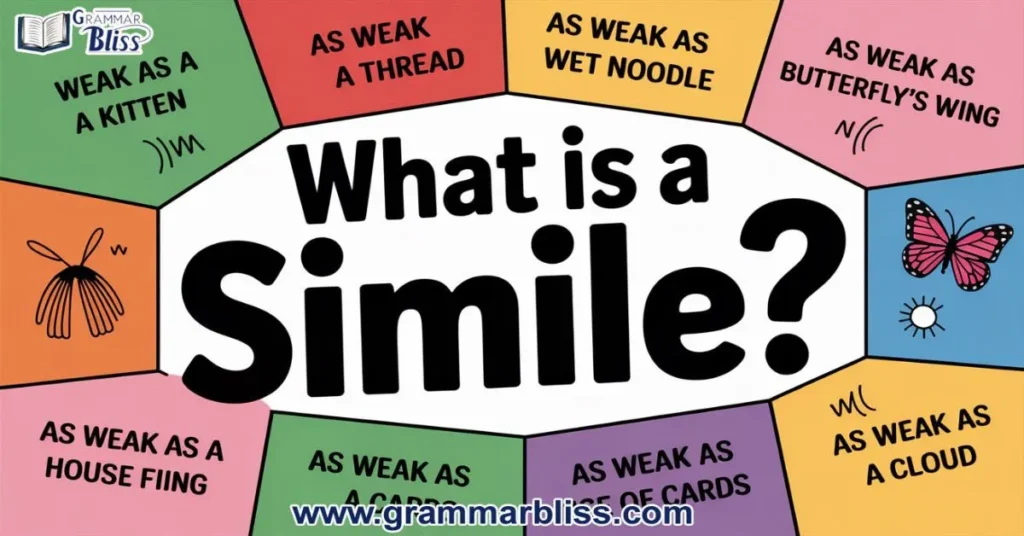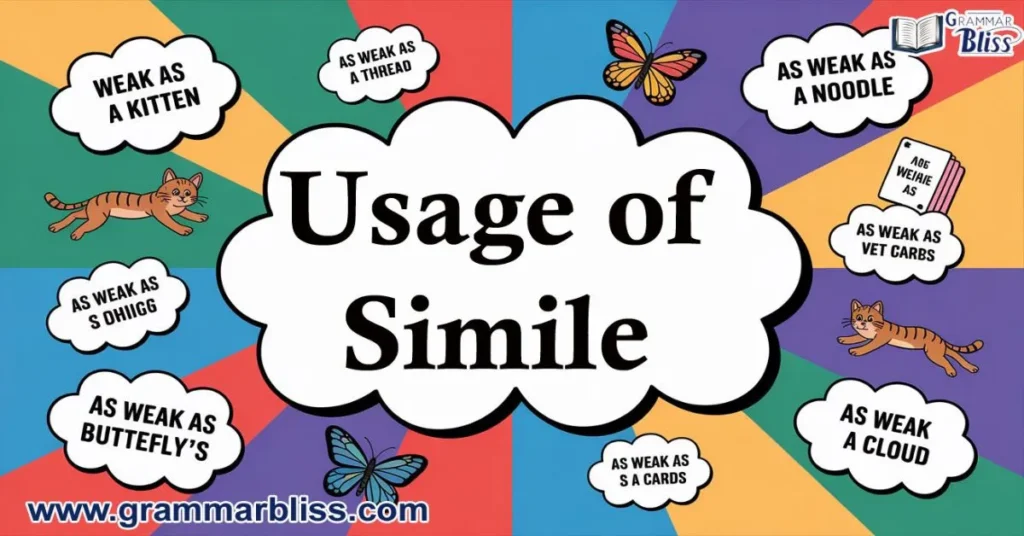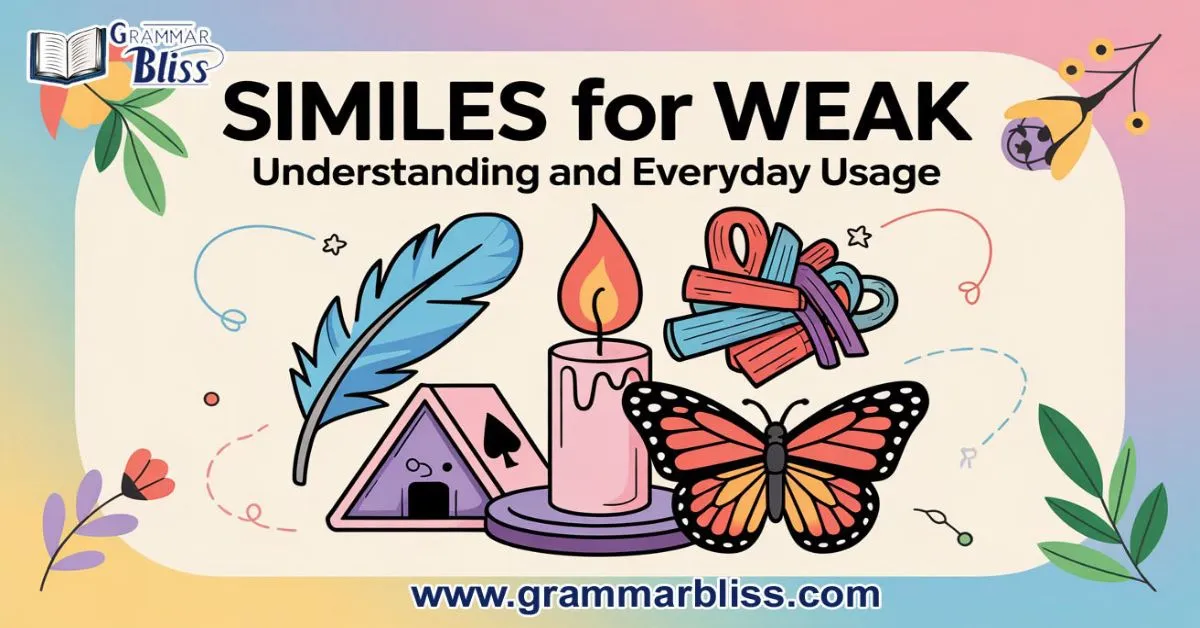Similes for Weak are powerful tools in language that help paint vivid pictures of fragility, vulnerability, and lack of strength. These comparisons use “like” or “as” to make the concept of weakness more relatable and memorable.
Whether you’re describing someone’s physical weakness or emotional fragility, similes can enhance your writing by evoking clear, impactful imagery. From “as weak as a kitten” to “as weak as a paper crane,” these phrases offer a creative way to express lack of strength or structural instability.
Here we’ll explore various similes for weak, offering examples and meanings that help you enrich your vocabulary and writing style.
Quick Summary
Here we will break down the meaning of similes and how they are used to describe weakness. We’ll explore a variety of similes for weak, focusing on those that describe physical weakness, emotional fragility, and structural instability. You’ll also learn about grammar rules for creating similes and how to apply them in different situations. Finally, we’ll address some common questions to help you better understand how to use similes effectively in everyday conversations and writing.
Read: happened-or-happend-whats-the-difference/
What is a Simile?

A simile is a figure of speech that compares two things using the words “like” or “as.” These comparisons help make writing and speech more colorful and vivid. For example, when we say something is “as weak as a kitten,” we’re using a simile to highlight the fragility and delicate nature of a kitten. The comparison to the kitten helps the listener or reader immediately understand that the subject is frail and lacking strength.
Similes are essential tools because they allow us to express complex ideas or feelings in a simple, relatable way. They make our language more descriptive, which is why you’ll find them all around us—in literature, storytelling, conversations, and everyday communication.
Usage of Simile

Similes are used in language to make comparisons that enhance descriptions, helping to communicate an idea more effectively. By using similes, we can create stronger imagery, engage the reader’s imagination, and clarify complex emotions or concepts. For example, when describing weakness, using a simile like “as weak as a damp towel” instantly conveys the idea of something limp, lifeless, and easily drained of strength. Similes for weak are particularly useful because they make the concept of fragility or vulnerability more tangible and relatable.
In daily life, you might hear similes in casual conversations, such as, “He was as weak as a wet noodle” to describe someone feeling physically exhausted or drained. The beauty of similes is that they can be used to describe not only physical weakness but also emotional fragility or structural instability, making them versatile and impactful in various situations.
Learn: using-am-is-and-are-understanding-grammar-with-examples/
Similes for Weak Examples
Weak as a kitten
Meaning: Very frail and delicate.
Example: After her surgery, she felt as weak as a kitten, barely able to move.
As weak as a thread
Meaning: Extremely fragile or easy to break.
Example: His resolve was as weak as a thread, and he quickly gave up on the task.
Weak as a reed
Meaning: Lacking strength or stability, often prone to bending.
Example: The structure was as weak as a reed, swaying dangerously in the storm.
As weak as a wet noodle
Meaning: Lacking firmness, limp, or without energy.
Example: After the long run, I was as weak as a wet noodle, unable to even stand up straight.
Weak as a butterfly’s wing
Meaning: Extremely delicate and fragile.
Example: Her patience was as weak as a butterfly’s wing after the exhausting meeting.
As weak as a house of cards
Meaning: Unstable, likely to collapse or fail easily.
Example: His argument was as weak as a house of cards, falling apart under scrutiny.
Weak as a feather
Meaning: Extremely light and fragile.
Example: The paper felt as weak as a feather in my hands and tore instantly.
As weak as a cloud
Meaning: Lacking substance, floating or drifting away easily.
Example: His excuse was as weak as a cloud, evaporating once questioned.
Weak as a candle flame
Meaning: Easily blown out, fragile, or faint.
Example: Her voice was as weak as a candle flame, barely audible in the crowded room.
As weak as a paper crane
Meaning: Delicate and easily torn or crushed.
Example: His feelings were as weak as a paper crane, easily hurt by the smallest comment.
Weak as a twig in a storm
Meaning: Lacking the strength to withstand pressure or challenges.
Example: She felt as weak as a twig in a storm, powerless against the harsh criticism.
As weak as a puddle of water
Meaning: Lacking form or strength, vulnerable.
Example: His plan was as weak as a puddle of water, with no real structure or depth.
Weak as a broken string
Meaning: Lacking the ability to function properly, fragile.
Example: After the long day, her energy was as weak as a broken string, barely able to hold on.
As weak as an echo
Meaning: Faint or easily lost, lacking impact.
Example: His argument was as weak as an echo, fading away without leaving any lasting effect.
Weak as a forgotten dream
Meaning: Faded, uncertain, or lacking substance.
Example: His motivation was as weak as a forgotten dream, quickly slipping away as time passed.
Similes for Weak People
As weak as a deflated balloon
Meaning: Lacking energy, deflated or exhausted.
Example: After the long hours of work, he felt as weak as a deflated balloon, drained of all energy.
Weak as a damp towel
Meaning: Limp, tired, or lacking strength.
Example: She was as weak as a damp towel, unable to keep up with the demanding schedule.
As weak as a sinking ship
Meaning: On the verge of collapse, overwhelmed.
Example: His confidence was as weak as a sinking ship, quickly fading after the difficult situation.
Weak as a flickering candle
Meaning: Unstable, flickering in and out, barely holding on.
Example: She felt as weak as a flickering candle, her emotions shifting back and forth under pressure.
As weak as a cracked egg
Meaning: Fragile and vulnerable to breaking.
Example: He was as weak as a cracked egg, easily broken by the harsh words thrown his way.
Weak as a hollow drum
Meaning: Lacking substance, empty inside.
Example: His arguments were as weak as a hollow drum, without any real foundation.
As weak as an untuned guitar
Meaning: Out of balance, unable to function properly.
Example: She was as weak as an untuned guitar, struggling to stay focused during the meeting.
Weak as a splinter
Meaning: Small, fragile, and easily broken.
Example: His resolve was as weak as a splinter, shattering when faced with adversity.
As weak as a fizzling soda
Meaning: Lacking energy, quickly losing force or momentum.
Example: His excitement was as weak as a fizzling soda, soon losing all of its energy.
Weak as a cracked mirror
Meaning: Broken, unstable, and easily shattered.
Example: She felt as weak as a cracked mirror, unable to pick up the pieces after the breakup.
As weak as a dried-up stream
Meaning: Lacking vitality, drained, or empty.
Example: His inspiration was as weak as a dried-up stream, running dry after all his hard work.
Weak as a sickly breeze
Meaning: Lacking strength, faint, or barely noticeable.
Example: Her words were as weak as a sickly breeze, barely making an impact on anyone.
As weak as a wilting flower
Meaning: Fading, fragile, and losing vitality.
Example: His spirit was as weak as a wilting flower, slowly fading after months of stress.
Weak as a shattered glass
Meaning: Broken and fragile, easily destroyed.
Example: She felt as weak as a shattered glass, falling apart with each challenge.
As weak as a tattered flag
Meaning: Torn, worn out, or losing strength over time.
Example: After the long struggle, he was as weak as a tattered flag, barely holding on to his willpower.
Explore: modal-verb-will-50-sentences-where-will-can-be-used/
Grammar Rule and Example
Similes are relatively simple when it comes to grammar. They use the words “like” or “as” to draw comparisons between two things. The key rule is ensuring the comparison is clear and adds to the understanding of the subject.
The structure is usually “as [adjective] as [noun]” or “like [noun],” where the adjective describes the characteristic being compared. For instance, “She was as weak as a wilting flower” follows the correct structure and provides a vivid image of frailty and emotional vulnerability.
Here’s another example: “His resolve was as weak as a cracked egg.” This sentence compares someone’s mental strength or resolve to an egg, which is fragile and easily broken. The comparison helps the reader understand that the person’s mental strength is easily defeated.
FAQ’s
What is a simile for weakness?
A simile for weakness compares something to a fragile or unstable object, like “as weak as a kitten” or “as weak as a broken string.”
Why are similes used to describe weakness?
Similes help create vivid imagery, making the description of weakness more relatable and easier to understand.
Can similes describe both physical and emotional weakness?
Yes, similes can describe both physical weakness, like “as weak as a puddle of water,” and emotional fragility, like “as weak as a forgotten dream.”
How do similes enhance writing?
Similes make writing more engaging by creating clearer and more relatable images, making the reader feel the weakness being described.
What’s an example of a simile for a weak person?
“As weak as a deflated balloon” is a simile describing a person lacking energy or strength.
Conclusion
Similes for weak are invaluable tools that can greatly enhance both writing and communication. By using vivid comparisons like “as weak as a twig in a storm” or “as weak as a deflated balloon,” you can effectively convey ideas of fragility, instability, and vulnerability in a more engaging way. Whether describing physical weakness or emotional fragility, these similes add depth to your language. So, next time you want to express weakness, consider using one of these powerful similes to make your writing more vivid and relatable.

